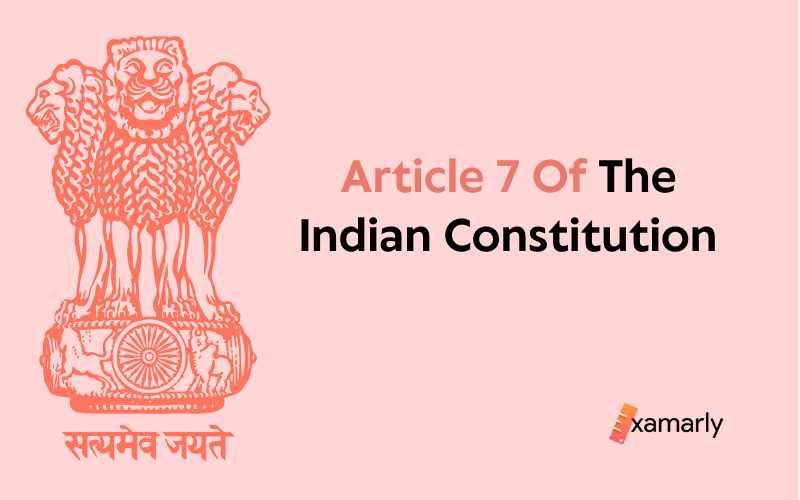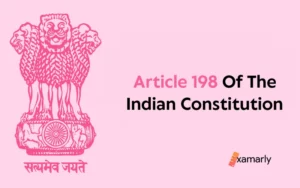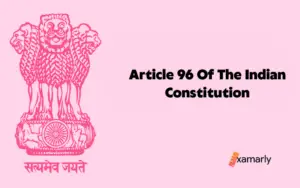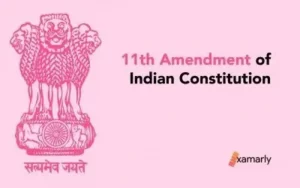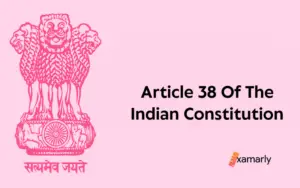Article 7 of the Indian Constitution deals with the citizenship rights of some immigrants to Pakistan.
Continue reading to discover more about Article 7 of the Indian constitution. The following article highlights the significant ideas of article 7 of the Indian constitution.
What Is Article 7 Of The Indian Constitution?
Citizenship Rights of Some Migrants migratory workers from Pakistan are discussed under article 7 of the Indian Constitution. People who migrated from Indian territory to those territories that are now a part of Pakistan after March 1, 1947, will not be considered Indian origin citizens, despite anything stated in articles 5 and 6 of the Indian constitution.
The citizen is only given to the individual if they migrate to a specific territory that is currently a part of Pakistan and then return to Indian territory under the provisions of permanent or resettlement-based issues, which are permitted by law.
Anyone who arrived in the Indian Territory after July 19, 1948, qualifies to become an Indian citizen.
Main Constituents
The Indian Constitution’s first clause states that anyone who moved from Indian territory to regions that are now a part of Pakistan will not be able to enjoy their rights as Indian citizens.
Additionally, there is a mention in case a person has already immigrated from India to Pakistan and has asked for resettlement. It states that the approval of citizenship will be handled by an official appointed by the Indian government.
It will be interpreted following Article 6’s clause (b). It grants citizenship rights if the migration took place after July 19, 1948. Such people may migrate in violation of issued return or resettlement permits, even though the document must formally certify the signatory’s authority.
Characteristics Of Article 7
Only Indian nationals are allowed to use and exercise their fundamental rights, according to the Indian Constitution. Additionally, the rights of citizenship are crucial. It is because only Indian nationals are eligible for employment in various public positions, including the court, president, and prime minister. The quality is described below.
- The first clause is about immigrants from India to Pakistan. They are not allowed to exercise their Indian citizenship rights.
- Additionally, it states that anyone who entered the country from Pakistan must have a valid return or resettlement notice.
- An official who follows the procedure and pattern set forth by the Indian government will approve the citizenship by law privileges. Before granting the rights of citizenship to the immigrant, the officer has to look into the matter and confirm all pertinent paperwork.
- Six months of residency within the country will not be accepted as proof of citizenship of persons.
Persons That Were Deemed To Be Citizens
The Indian Constitution provides for several categories of citizens. These people are entitled to political and civil rights. They also enjoy full membership in the state and political community. Citizenship confers certain benefits under the Constitution, but only natural persons are considered citizens or citizenship by naturalisation. Juristic persons do not have the right to citizenship, as this citizenship claim is reserved for the Indian people.
A person born in India may be considered a citizen of India, but only after registering with the Indian government. They must submit a form to a diplomatic or consular representative to qualify for citizenship. This process may be completed before or after the Constitution comes into effect.
Provisions Under Article 7
- Citizen by Birth: Anyone born on or after January 1, 1950, is a citizen by birth. All those born between January 1, 1950, and July 1, 1987, were included in the limit. It was as if the person was not an illegal immigrant. The Citizenship Amendment Act of 2003 recognized citizenship by birth. Additionally, parents who were born in India but are currently residing abroad may petition for citizenship.
- Citizenship by descent: If either of the applicant’s parents was living in India at the time of birth, they may apply for citizenship. As a result, the person’s birth certificate should be from an Indian municipal corporation and include parental residency documentation.
- Citizenship by registration: Citizenship through registration may be obtained if one or both partners are Indian. At the time of registration, the marriage should not have been less than years.
Also included in the Indian Constitution are provisions for Article 7 impeachments, subject to parliamentary legislation. Additionally, depending on the socioeconomic environment, any article could be impeached.
Case Laws
In State of Bihar v. Kumar Amar Singh, the wife fled to Karachi after divorcing her husband. She claimed that she traveled there briefly for medical care. She then returned to India, where she was allowed to stay because she claimed to be from Pakistan. Then, when the period was through, she went back to Pakistan. When her property in India was going to be taken into custody, she then wanted to obtain permanent Indian citizenship. It was decided that she wouldn’t be granted permanent citizenship because she immigrated before the deadline specified in the provision.
Conclusion
The Indian Constitution has established provisions for migrants from Pakistan who have received a notice of return or resettlement. After moving from India to Pakistan, Article 7 of the Indian Constitution prohibits exercising citizenship rights. If an individual receives resettlement or returns notice from legitimate authorities, even after migration, citizen rights may still be granted. The person must also be a resident of more than six at the time of registration. If both parents were born in India, among other criteria, a non-resident of India may be granted citizenship.


